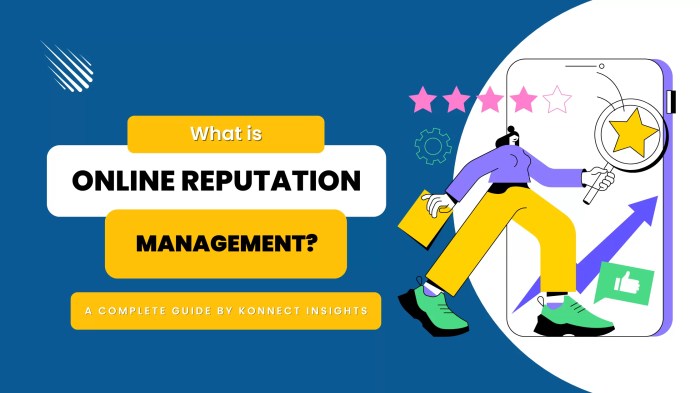Online Reputation Management is crucial in today’s digital age, where perceptions can make or break businesses and individuals. From social media to search engine results, maintaining a positive online image is key to success.
In this guide, we will explore the definition, strategies, tools, and case studies related to managing online reputation effectively.
Definition of Online Reputation Management

Online Reputation Management (ORM) is the practice of monitoring, influencing, and managing an individual’s or business’s online reputation. This involves creating a positive online presence, addressing any negative feedback or reviews, and actively engaging with customers or followers on various online platforms.
Importance of Managing Online Reputation
Managing online reputation is crucial in today’s digital age as it can significantly impact the success and credibility of a business or individual. Here are some reasons why managing online reputation is important:
- Build Trust and Credibility: A positive online reputation helps build trust with customers and clients, leading to increased credibility and loyalty.
- Attract Customers: Potential customers often research a business online before making a purchase decision. A strong online reputation can attract new customers and boost sales.
- Protect Brand Image: Negative reviews or comments can harm a brand’s image. Effective ORM helps in addressing and mitigating any negative feedback before it escalates.
Examples of Impact of Online Reputation
Online reputation can have a profound impact on businesses and individuals alike. Here are some examples of how online reputation can influence:
- A negative review on social media can deter potential customers from choosing a particular restaurant for dining.
- Positive testimonials and reviews on an e-commerce platform can boost sales for a small business or online seller.
- An individual’s negative online presence can affect their job opportunities or professional relationships.
Strategies for Online Reputation Management

In today’s digital age, managing online reputation is crucial for individuals and businesses alike. Here are some effective strategies to maintain a positive online presence:
Social Media Engagement
- Regularly monitor social media platforms for mentions and comments.
- Respond promptly and professionally to both positive and negative feedback.
- Create engaging content to build a strong online community and foster positive relationships with followers.
Proactive Online Monitoring, Online Reputation Management
- Utilize online monitoring tools to track mentions of your name or brand across the web.
- Address any negative reviews or misleading information promptly to prevent further damage to your reputation.
- Stay informed about industry trends and news to proactively address any potential issues before they escalate.
Content Creation and
- Produce high-quality content that showcases your expertise and values.
- Optimize your content for search engines to ensure it ranks well and reflects positively on your reputation.
- Regularly update your website and social media profiles with fresh, relevant content to maintain a strong online presence.
Tools and Technologies for Online Reputation Management
Online reputation management relies on various tools and technologies to monitor, analyze, and improve a brand’s online presence. These tools are crucial for businesses to stay ahead of their online reputation and maintain a positive image in the digital world.
Popular Tools for Monitoring Online Reputation
- Google Alerts: A free tool that notifies users when their brand is mentioned online.
- Social Mention: Monitors social media platforms for brand mentions and sentiment analysis.
- Reputology: Focuses on monitoring and managing online reviews across different review sites.
- Brandwatch: Provides real-time insights and analytics on brand mentions and customer feedback.
Importance of Analytics in Tracking Online Reputation
Analytics play a crucial role in tracking online reputation as they provide valuable insights into customer perceptions, trends, and areas that need improvement. By analyzing data from various sources, businesses can make informed decisions to enhance their online reputation and customer satisfaction.
How Sentiment Analysis Helps in Managing Online Reputation
Sentiment analysis is a powerful tool that uses natural language processing to determine the sentiment (positive, negative, or neutral) behind online mentions of a brand. By analyzing sentiment, businesses can identify patterns, address negative feedback, and capitalize on positive feedback to improve their online reputation.
Case Studies on Online Reputation Management
In the world of online reputation management, success stories and cautionary tales can provide valuable insights into what works and what doesn’t. Let’s dive into some case studies that showcase effective strategies and approaches in managing online reputation.
Analyzing a Successful Online Reputation Management Campaign
One notable example of a successful online reputation management campaign is that of Domino’s Pizza. In 2009, Domino’s faced a crisis when two employees uploaded a video of themselves engaging in unsanitary food handling practices. The video went viral, causing a significant backlash against the brand. However, Domino’s responded swiftly by issuing a public apology, launching a new advertising campaign, and revamping their menu. They also actively engaged with customers on social media to address concerns and regain trust. As a result of their proactive approach, Domino’s was able to turn the situation around and rebuild their reputation.
Comparing Different Approaches to Handling Reputation Crises
When it comes to handling reputation crises, different companies may take varying approaches. For example, United Airlines faced a major backlash in 2017 when a video of a passenger being forcibly removed from an overbooked flight went viral. United initially issued a tone-deaf response, which only fueled the outrage further. In contrast, Airbnb encountered a similar crisis when a guest trashed a host’s property. Airbnb took immediate action by banning the guest, compensating the host, and implementing new safety measures. By addressing the issue head-on and demonstrating a commitment to customer safety, Airbnb was able to mitigate the damage to their reputation.
Examples of Companies Effectively Managing their Online Reputation
Another company that effectively managed its online reputation is Starbucks. In 2018, Starbucks faced backlash over an incident in which two black men were arrested at one of their stores. Starbucks responded by issuing a public apology, closing their stores for a day of racial bias training, and implementing new policies to prevent similar incidents. Their swift and decisive actions demonstrated a commitment to diversity and inclusion, helping to repair their reputation and rebuild trust with customers.





